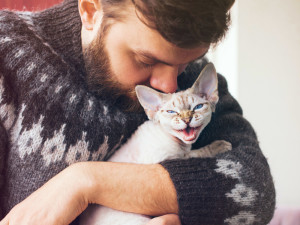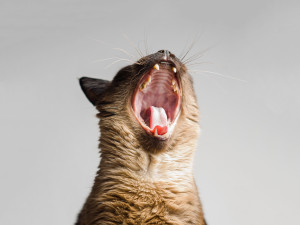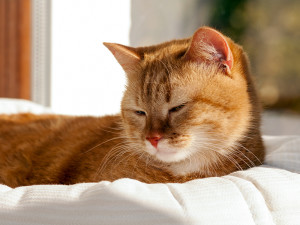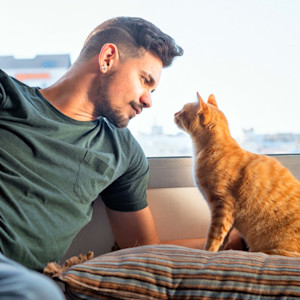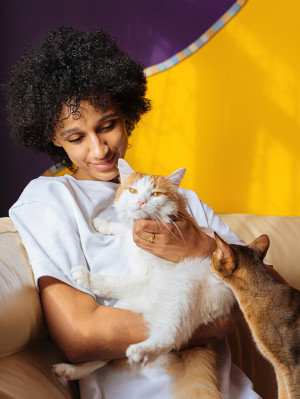Why Does My Kitten Keep Meowing?
What to do, when something that was cute at first becomes perplexing.
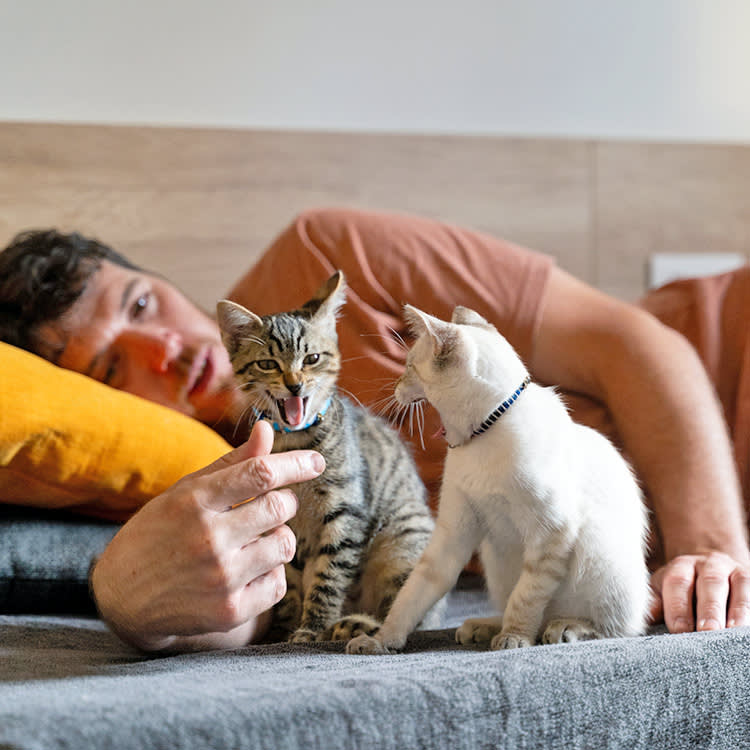
Share Article
In This Article:
What Is Excessive Vocalization in Kittens?opens in a new tab Potential Reasons for a Kitten Constantly Meowingopens in a new tab When to See a Vetopens in a new tab
Adult cats know how to get your attentionopens in a new tab to communicate what they want or need. It takes very little time for a new pet parent to an adult cat to realize they use different meows to mean different things.
Frantic meowing early in the morning usually means something like they believe you’ve forgotten they’re alive, and they’ll soon die of malnutrition — even though there’s still food in the bowl. A low meow, combined with twining in between your legs as you come through the door, is either a heartfelt hello or part of a plot to injure you, so you’ll never leave them again.

littleKin™ is Kinship’s home just for puppy and kitten parents. Bop over to check out expert advice, new pet tools, and special deals—all curated for your newest family member.
opens in a new tabHowever, kittens are something else entirely. They’re too young to have a repertoire. They use a single meow to communicate everything. And sometimes those meows are constant no matter what you do.
Your kitten’s constant meowing can feel like a puzzle you’re desperate to solve. Are they hungry, bored, or just saying hi? When it comes to understanding why kittens vocalize so much, it helps to look at the possible reasons behind their chatter and figure out what they’re trying to tell you.
What is excessive vocalization in kittens?
Kittens are natural communicators, and meowing is one of their favorite ways to get your attention. But what counts as too much? Excessive vocalization happens when your kitten meows so often it feels out of the ordinary — like they’ve got something urgent to say, and they won’t stop until you listen.
While some meowing is normal (especially for young cats still figuring out the world), constant vocalization might signal an unmet need or an underlying issue. Let’s break down the most common reasons your kitten is meowing nonstop.
Potential reasons for a kitten constantly meowing
They want attention.
Kittens love attention, and they’ve quickly figured out that meowing gets resultsopens in a new tab. If your kitten is yowling whenever you leave the room or look at your phone, it might be their way of saying, “Hey, don’t forget about me!” They’re social creatures and often crave interaction.
Jennifer Van de Kieft, a feline behaviorist and feeding coach, explains: “Young kittens need a lot of food to support their growth. When not sleeping, they often have tons of energy and need a lot of playtime and attention. It’s a big commitment getting a kitten.”
It could also be that your cat is lonely. In this case, they need companionship, rather than just attention. Van de Kieft continues: “Your kitten may need attention, so provide affection or play, if they are in a playful mood. Many kittens do not like to be left alone. An easy fix is to adopt two kittens at once or get a second kitten for your kitten. This way, your kitten has companionship — when you’re not around or are busy — and a buddy to play with. It’s not recommended to get a single kitten. Many rescue groups do not adopt out a single kitten unless you already have a young cat at home that can make a good companion.”
They are bored or hungry.
Kittens are tiny energy bombs who need mental stimulation and playtime. If they’re bored, they might start meowing to pass the time — or to nudge you into entertaining them. Try rotating toys or setting up a play session to see if that curbs their chatter.
Make sure to keep their toys in a central location where your kitten can find them. They’ll scatter them around the house while playing, so spending a minute or two to gather them all can help head off toy-related boredom.
It’s also true that a hungry kitten is a loud kitten. If meowing peaks around mealtimes, they’re probably asking for food. Keep an eye on their feeding schedule, and if they’re still vocal despite being fed, it might be time to assess if they’re getting enough to eat.
If it looks like they’re getting plenty of food but are still hungry, it might be worth reconsidering what you’re feeding them. A vet can recommend options for maximum nutrition that will also be satisfying.
“When not medically related, kittens and cats often meow when they are hungry or bored. With a kitten, you need to learn their routine and what they need,” Van de Kieft notes. “Try food, and if they are not hungry, then offer a toy to play with. They may also just want to be held or pet depending on the kitten.”
They feel unsafe.
A frightened kitten can meow as a distress call. Changes like a new home, unfamiliar faces, or loud noises can trigger feelings of insecurity. Offering them a safe space or comforting them can help ease their nerves. Understanding how your cat imprints on youopens in a new tab might also help you connect better with them.
They need to poop.
Yes, it’s that simple. Sometimes kittens meow because they need to go — or because they’re struggling to do so. If they seem uncomfortable, or their litter box isn’t up to their standards, that could be the issue.
If you think the need to go is the root of your kitten’s meowing, here are a few things to try.
Check for blockages like intestinal parasites. If you’re not sure your kitten has been dewormed, a dewormer might be what’s needed to get things moving.
Add a little bit of canned pumpkin to your kitten’s food. The fiber will help bulk things up and move them along. Make sure you’re using pure pumpkin and not pumpkin filling, which has additives that are not good for your kitty.
Try to get them to be more active. Sometimes physical inactivity can cause constipation, so if your kitten has been pretty sedentary and is now meowing excessively, activity could help.
Make sure they’re properly hydrated. Without enough water, your kitten will struggle to have normal bowel movements and may become constipated.
Try a laxative (but check with a vet first). You’ll find plenty of gentle laxatives on the market, such as Lactulose, which can soften hard stools and help your kitten poop.
Go with manual stimulation. No one really wants to talk about it, but sometimes physical intervention is necessary. Using a soft cloth, gently rub your kitten’s anus to stimulate their bowels.
Finally,constipation can be a serious issueopens in a new tab if it goes on too long. Make an appointment with your vet for a deeper dive, to prescription medications, or to administer an enema (which you should never try at home).
They are in pain.
A kitten in pain will often vocalize as a cry for help. If this is accompanied by unusual behavior (such as limping, hiding, or refusing to eat), pay attention: Pain could be the source of their meowing.
If you can’t determine the cause of the pain, make an appointment with your vet. Cats can also develop health conditions that make them more likely to meow excessively, including hyperthyroidism and kidney diseaseopens in a new tab.
They have anxiety or are under stress.
Kittens can feel stress and anxiety just like us. Big changes, such as moving or introducing them to a new pet, can leave them feeling unsettled. Other sources of stress can include:
Changes in diet
Changes in routine (theirs or yours)
Under- and overstimulation
Unfamiliar people
Loud noises (construction, roadwork, etc.)
Litter box issues (including the litter box being in a location that frightens your kitten)
Vocalizing might be their way of expressing that something doesn’t feel right.
They are greeting you.
Sometimes, meowing isn’t about a problem — it’s just your kitten saying hello. Cats often use vocalization as a friendly greeting, especially if you’ve been away for a while. While older cats might only vocalize with humans, kittens use meowing to communicate with other cats, too. So if you have multiple cats, your kitten could just be trying to communicate with those around them.
When to see a vet
If your kitten’s meowing seems excessive, and none of the usual fixes (like food or play) work, it’s worth a trip to the vet. Persistent vocalization can sometimes point to medical issues, such as digestive problems, illness, or even hearing loss.
Trust your instincts. If something feels off, it’s better to get them checked out. While it might turn out to be nothing at all, it’s always better to catch potential health issues early.
FAQs
Why does my kitten keep meowing for no reason?
There’s almost always a reason for your kitten’s meows — it’s just not always obvious. They might be seeking attention, testing boundaries, or reacting to changes in their environment. If nothing stands out, watch their behavior closely for other clues.
Is it normal for a new kitten to meow a lot?
Yes. New kittens are adjusting to a whole new world, and meowing is one way they communicate their needs (or confusion). Over time, they’ll likely settle into a quieter routine.
Should I ignore my kitten meowing?
Never ignore a kitten who’s constantly meowing. “You want to find the underlying issue and address it,” Van de Kieft explains. “If your kitten is hungry, feed them. Kittens can eat twice as much as adult cats to support their growth…up to 500 kcals each day, depending on what stage they are in. Ask your veterinarian if you’re not sure if you’re feeding your kitten enough. If they’re bored, provide some entertainment. A kitten needs roughly four play sessions each day with a wand toy. Supplement with safe electronic toys.” And if your kitten meows while following you everywhereopens in a new tab, they might just be trying to stay close to their favorite person.
References
“6 Reasons Your Kitten Is Crying.” www.petmd.com, www.petmd.com/cat/slideshows/6-reasons-your-kitten-cryingopens in a new tab.
Ashley S. “Why Is My Cat Excessively Meowing?” All Kinds Veterinary Hospital, 10 Nov. 2021, allkindsvet.com/cat-meowing/opens in a new tab.
Eckstein, Sandy. “Cat Excessive Meowing and Yowling: Why Cats Meow.” WebMD, www.webmd.com/pets/cats/cats-excessive-meowingopens in a new tab.
Esposito, Danielle. “Here’s Why Your Kitten Is Meowing so Much (and How to Get Her to Stop).” The Dodo, 23 May 2022, www.thedodo.com/dodowell/kitten-is-meowingopens in a new tab. Accessed 7 Dec. 2024.
“Why Is My Cat Meowing So Much?” www.petmd.com, www.petmd.com/cat/behavior/cat-meowingopens in a new tab.

Valerie Mellema
Valerie Mellema has a Bachelor of Science in Agribusiness and Equine Industry from West Texas A&M University. She has been a professional writer for the past 20 years, covering a wide variety of pet health and care topics before founding a nonprofit focused on mental health in children and thoroughbred aftercare. She has four Border Collies and eight retired racehorses.
Related articles
![cat meowing]() opens in a new tab
opens in a new tabWhy Does My Cat Meow So Much? Reasons Your Cat Meows Excessively
How to decode your cat’s love language when one meow has many meanings.
![Red cat with squinted eyes laying in a basket closeup]() opens in a new tab
opens in a new tab6 Ways Your Cat Could Tell You They Are in Pain
Here are all the way your kitty is trying to tell you they’re hurting.
![Man looking at his orange cat at home.]() opens in a new tab
opens in a new tabThis Free AI App Can Tell You What Your Cat’s Meows Mean—Supposedly
Meet MeowTalk, the app that translates your kitty’s screams into actual English.
![A woman with curly black hair sitting in front of a dark purple and yellow backdrop while looking down affectionately at her two cats sitting on her lap]() opens in a new tab
opens in a new tabHow to Build Your New Cat’s Trust in You
If your cat still approaches you with a figurative arched eyebrow of skepticism, try these tricks to put them at ease.

